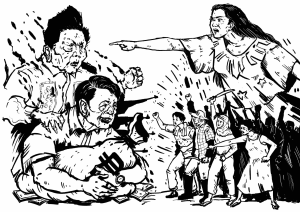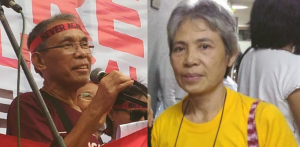Bring home abused migrants, fight the labor export policy


Sally is one of the migrant workers who just arrived home from Kuwait. Before coming home, she stayed for a period in a Philippine shelter for victims of human trafficking while while documents for their return to the Philippines are being processed. . Sally came home empty handed because she was not at all paid by her employer.
More than 400 migrants are in the shelter of the Philippine embassy in Kuwait, according to Sally. She said the process to return home is painstakingly slow and migrants are squeezed like animals in a coop in the shelter. Many of them become sick because of inhumane conditions. Apart from those in the shelter, many other Filipino migrants are in Kuwaiti prisons for having abandoned their employers and other violations of the kafala system.
Sally joined a press conference with Migrante and church people on January 27 after news of the brutal murder of another Filipina domestic worker came out on January 18. Jullebee Ranara, 35 years old, was raped and killed by the son of her employer. Her corpse was burned and left in the dessert.
Before cameras and microphones, claims of all-out support are hypocritically made by the state, from the president to the Department of Migrant Workers and OWWA. Behind this, thousands of migrant Filipinos are neglected by the state in brutal and inhumane working conditions in the Middle East. From 2017, not less than 6,000 cases of abuses on Filipino workers were recorded in Kuwait. At least 126 Filipinos were killed in the country since 2016. This includes Joanna Daniela Demafelis (2018), Constancia Lago Dayag (2019), and Jeanelyn Villavende (2019).
According to the United Methodist Church, since the news of Ranara’s death, not less than 10 former domestic workers in Kuwait who were also victims of rape asked their office for help. They may have returned to the Philippines alive, but not one of them received any help from the government.
Brutality and modern slavery
The group Migrante estimates that around 15 million Filipinos work oversea!s. Overseas Filipino workers (OFW) send remittance equivalent to 8.9% of the gross domestic product or GDP. Majority are women (59.6%) but their share of total remittances is smaller (44.47%) because they often are employed in lower class of work and earn meager wages. Many are domestic workers and some are cleaners or vendors.
In the Middle East, the biggest number of Filipino migrants are in Saudi Arabia, followed by United Arab Emirates, Kuwait and Qatar. The kafala system is in effect in these countries, like in all other states in the region except Iraq. This is also known as the “sponsorship system,” wherein the state permits individuals or companies to directly hire foreign employees. The employer pays for all expenses of contractual workers. In exchange, the employer holds not only the livelihood of the employee but also his or her entire. Migrant contractuals are prohibited to transfer work, leave or go home if they wished.
As a result of this system, migrant workers receive very low wages and experience inhuman working conditions, various forms of abuses and brutal crimes. Crimes against women workers, including rape, are widespread. In reality, the kafala system is modern-day slavery.
In 2022, almost 6,000 cases of maltreatment and abuse against migrant workers were recorded by the PSA, and 5,201 of these were in the Middle East. Only 200 of these cases are brought before courts.
Sold like meat
The kafala system and criminal and abusive employers are not the only reason for the extreme conditions of contractual workers overseas. The Philippine reactionary state is also culpable for the deregularization of the processes of sending workers and passing to the private labor agencies the responsibility of monitoring and ensuring their welfare. The officials of the government’s embassies have been proven inutile countless times in providing emergency help for migrants.
The biggest crime of the state is its labor export policy in which it sells Filipino migrants “like meat” in the international labor market. The state does this to squeeze maximum remittance. According to Migrante, the state pushed for the deregulation of deployment so that Filipino workers will remain “competitive” or keep them “marketable.” In line with this policy, the government compels domestic helpers to bear with their situation where they are contracted to abusive employers and passes state obligation to recruitment agencies when workers face threats, are maltreatead or become victims of attempted murder.
Everyday, more than 6,000 Filipinos leave the country to work. While the number continues to increase, the state’s capacity and interest to protect them shrinks.
Migrante lambasted the labor export policy and called for its end. Instead of selling workers abroad, the state must immediately outline a sustainable program for the reintegration of workers. The country will fully benefit from the skills and labor of nurses, teachers, caregivers and many others forced to work abroad. At the same time, contractual workers suffering overseas must immediately be repatriated and justice be given to all victims of maltreatment, abuse and killings.










